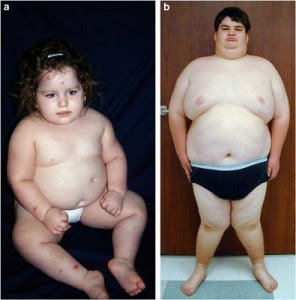Prader Willi syndrome is a rare genetic disorder, causing life threatening obesity in many different children. It is a congenital (present from birth) disease related with an abnormality of 15th chromosome, results in a number of physical, mental and behavioral problems. This disease was first identified by Swiss doctors A. Prader, H. Willi and A. Labhart in 1956. It is supposed that symptoms related with Prader-Willi syndrome (PWS) are caused by a defect in the hypothalamus part of the brain that controls feelings of fullness or hunger. So, people suffering from this disorder never feel full and have a constant urge to eat, eventually leading to life-threatening obesity.

Prader Willi syndrome can take place in both males and females, equally across all races. Incidence of the disease has been debated but according to estimation, it could occurs as often as one in every eight thousand, up to one in every twenty five thousand individual. People having this disorder have muscle weakness, behavioral problems, are obsessed with speech difficulties due to defect in hypothalamus. Hypothalamus is an important supervisory center in the brain that controls metabolism of fats and carbohydrates, sugar levels in the blood, heartbeat, the expression of emotions, body temperature, blood pressure, the regulation of the sleep-wake cycle, the development of muscle tone, and many more functions of the body. The hypothalamus is also linked to the pituitary gland and so Prader-Willi syndrome also impacts the function of the pituitary gland which controls the release of important hormones, including growth and sex hormones.
Symptoms of Prader-Willi syndrome:
People suffering from this disorder experience symptoms in two stages.
Stage 1:
Infants having Prader-willi syndrome can have low muscle tone affecting their capacity to such properly. Due to this, they require special feeding assistance to help them eat and they may have problems gaining weight. As they grow older, the situation gets better.
Stage 2:
The children with this disorder, between the ages of 1 and 6 years, may feel constant hunger; have an insatiable appetite, meaning they never feel full.
Although they eat more, but as they have less muscle mass, they do not burn as many calories as the normal peers leading to the development of life-threatening obesity.
Other symptoms that may affect people with Prader-Willi syndrome include
- Behavioral problems such as stubbornness or temper tantrums
- Picking at skin
- Low sex hormone levels
- Repetitive thoughts and verbalizations
- Collecting and hoarding of possessions
- Delayed motor skills and speech due to low muscle tone
- Cognitive problems, ranging from near normal intelligence to mild intellectual and developmental disabilities; learning disabilities are common
It is considered a spectrum disorder that means the symptoms are varied from person to person and may range from mild to severe. People having Prader-Willi syndrome frequently have some special mental strengths as well, for example skills in jigsaw puzzles. People with the syndrome can live a normal lifespan if obesity can be prevented.
Treatments for Prader-Willi syndrome:
No treatments are available for Prader-Willi syndrome but early intervention can help people with the disorder to build skills for living a better life. Early diagnosis is important and fortunately it can be simply done by a health care provider by blood testing.
To control weight gain and develop motor skills, exercise and physical activity can help. To develop oral skills, speech therapy may also help. Human growth hormone can help to increase height, reduce body fat, and increase muscle mass. In people with Prader-Willi syndrome, nothing can help to control appetite.
Prader-Willi Syndrome information video from Youtube:
Related posts:
